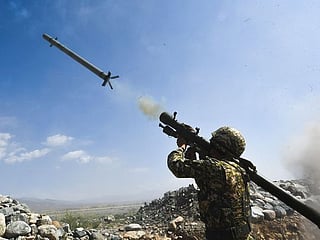COVID-19 travel rules in the West are discriminatory. Here is why
Almost two years on, it is time for us to stand up, fight back and reclaim our lives

Do you miss travelling? The adventures of going to a new country and exploring its sights and culture? The excitement of eating new kinds of food, meeting new people and learning a new language? I know I do.
The last 18 months have grounded most of us and as we inch towards two years of the pandemic, it is incredible that travel all over the world has become even more complicated and near impossible in many cases.
The biggest sufferers have been students, whose dreams of studying abroad have been hit, and families torn apart for months on end by COVID restrictions. Not to mention the travel and tourism industry which has suffered unprecedented losses.
Precautions thrown out of the window
Instead of finding ways to open up borders, many parts of the world are doing the exact opposite. It is almost as if the coronavirus has held us hostage, gripped us with so much fear, that it completely rules our lives. Any sense of balance and moving to open up with precautions has been thrown out of the window.
Sample this. Indians double vaccinated with Covishield, a World Health Organisation (WHO) recognised vaccine, can now go to countries like France, Switzerland, the UAE, Canada, the Maldives etc for tourism. But the United States is still not allowing non essential travel from India and even from Europe and the UK.
There is growing anger about this in the UK and many European countries who had opened up for US travellers and who are now clamping down since the Delta variant is ripping through the US.
Meanwhile the UK, which has a convoluted traffic light system for travel, recently put India on the ‘amber list’, down a notch from the dreaded ‘red list’, which means double vaccinated Indians can now quarantine at home or a place of their own choosing for ten days, instead of the mandatory hotel quarantine. And you can get out earlier if you pay for an extra RT-PCR test on day 5.
For the UK, Indians are already forced to pay for a PCR test 72 hours before travel, then on day 2 and day 8 after landing.
A blatant discrimination
In what is blatant discrimination, the UK has exempted double vaccinated travellers from Europe and the US from any kind of quarantine from ‘amber list’ countries, including those vaccinated with the AstraZeneca vaccine. Covishield is the exact same vaccine sold in India but it is not recognised for exemption by UK authorities. Why?
Till now, neither the UK government nor Adar Poonawala of the Serum Institute, which manufactures Covishield, have given an adequate explanation for this. The United States does not recognise covishield at all, even though the WHO does.
Countries like Australia have gone even more extreme and are not allowing their own citizens to leave the country and have made it harder for their overseas citizens to come back home. It has lead to speculations about Australia’s credentials as a liberal democracy.
Instead of restricting and closing borders, we need to open up carefully. There should only be one criteria: travellers must be double vaccinated with a WHO approved vaccine and must do an RT-PCR test within 48 to 72 hours before travel since vaccinated people can still transmit the virus.
This should be enough to allow people in without quarantine. Those who are not vaccinated or partially vaccinated should quarantine.
Right now, travel rules by some countries are random and discriminatory. Why should countries, who are part of the WHO, not recognise WHO approved vaccines? Almost two years on, it is time for us to stand up, fight back and reclaim our lives.
Sign up for the Daily Briefing
Get the latest news and updates straight to your inbox









